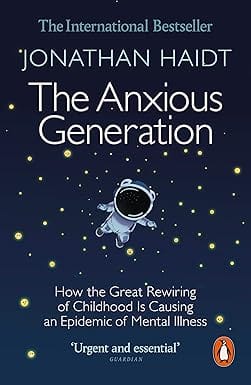- Contemporary Fiction
- Contemporary Fiction
- Children
- Children
- Comics & Graphic Novels
- Comics & Graphic Novels
- Non-Fiction
- Non-Fiction
- Fiction
- Fiction
In the early 1960s scientists at the University of California, Berkeley set out to establish the key factors affecting health and longevity. Their results, known as the 'Alameda 7', you already know: don't smoke, drink in moderation, sleep seven to eight hours a night, exercise, eat regular meals, maintain a moderate weight, eat breakfast. Years later, however, the same team discovered an eighth factor, one that proved more important than all the others: social connection.
When we form meaningful bonds with others, our wounds heal faster, we shake off infections more quickly and our blood pressure drops. We are less likely to have Alzheimer's, heart attacks or strokes. When people feel that they have strong social support, they perform better on tests of mental focus, memory and problem solving. Greater connection can fuel creativity, increase our financial stability and enhance our work productivity. But making friends can also be daunting.
In The Laws of Connection, David Robson does two important things: he takes us through the fascinating science behind the effects of social connection and he unpacks the research that shows that we are all better at being social than we might think. We meet ideas such as 'the liking gap' and 'the gratitude gap', learn to recognise 'frenemies' and discover a powerful conversational strategy known as the 'fast-friends procedure' that promotes instant rapport. Being social doesn't have to mean having dozens of friends, it can also mean having one true, deep connection with another person. As Robson shows, we can all benefit from the laws of connection.
Book Description
About the Author
David Robson is an award-winning science journalist. His first book, The Intelligence Trap, has been translated into 15 languages and his second,
- Home
- Psychology
- The Laws Of Connection 13 Social Strategies That Will Transform Your Life
The Laws Of Connection 13 Social Strategies That Will Transform Your Life
SIZE GUIDE
- ISBN: 9781805300311
- Author: David Robson
- Publisher: Canongate Books
- Pages: 320
- Format: Paperback
Book Description
In the early 1960s scientists at the University of California, Berkeley set out to establish the key factors affecting health and longevity. Their results, known as the 'Alameda 7', you already know: don't smoke, drink in moderation, sleep seven to eight hours a night, exercise, eat regular meals, maintain a moderate weight, eat breakfast. Years later, however, the same team discovered an eighth factor, one that proved more important than all the others: social connection.
When we form meaningful bonds with others, our wounds heal faster, we shake off infections more quickly and our blood pressure drops. We are less likely to have Alzheimer's, heart attacks or strokes. When people feel that they have strong social support, they perform better on tests of mental focus, memory and problem solving. Greater connection can fuel creativity, increase our financial stability and enhance our work productivity. But making friends can also be daunting.
In The Laws of Connection, David Robson does two important things: he takes us through the fascinating science behind the effects of social connection and he unpacks the research that shows that we are all better at being social than we might think. We meet ideas such as 'the liking gap' and 'the gratitude gap', learn to recognise 'frenemies' and discover a powerful conversational strategy known as the 'fast-friends procedure' that promotes instant rapport. Being social doesn't have to mean having dozens of friends, it can also mean having one true, deep connection with another person. As Robson shows, we can all benefit from the laws of connection.
Book Description
About the Author
David Robson is an award-winning science journalist. His first book, The Intelligence Trap, has been translated into 15 languages and his second,
User reviews
NEWSLETTER
Subscribe to get Email Updates!
Thanks for subscribing.
Your response has been recorded.

India's Iconic & Independent Book Store offering a vast selection of books across a variety of genres Since 1978.
"We Believe In The Power of Books" Our mission is to make books accessible to everyone, and to cultivate a culture of reading and learning. We strive to provide a wide range of books, from classic literature, sci-fi and fantasy, to graphic novels, biographies and self-help books, so that everyone can find something to read.
Whether you’re looking for your next great read, a gift for someone special, or just browsing, Midland is here to make your book-buying experience easy and enjoyable.
We are shipping pan India and across the world.
For Bulk Order / Corporate Gifting
 +91 9818282497 |
+91 9818282497 |  [email protected]
[email protected]
Click To Know More
INFORMATION
ACCOUNT
QUICK LINKS
ADDRESS
Shop No.20, Aurobindo Palace Market, Near Church, New Delhi













